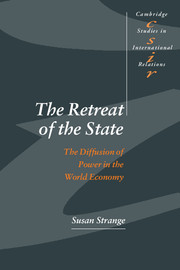Preface
Published online by Cambridge University Press: 07 October 2009
Summary
There is no great originality in the underlying assumption of this book – which is that the territorial boundaries of states no longer coincide with the extent or the limits of political authority over economy and society. In an earlier antitextbook for students of international political economy, States and Markets, I laid out a simple framework for analysing the who-gets-what of world society based on four basic structures. In these, power over others, and over the mix of values in the system, is exercised within and across frontiers by those who are in a position to offer security, or to threaten it; by those who are in a position to offer, or to withhold, credit; by those who control access to knowledge and information and who are in a position to define the nature of knowledge. Last but not least, there is the production structure, in which power is exercised over what is to be produced, where, and by whom on what terms and conditions. All of these power structures spill over those often arbitrary lines that are drawn on maps to indicate the territorial limits of the authority of one state from that of another. While some structural power over your security is still exercised within these territorial lines by the political authority of that state, not all of it is provided, nor all of it threatened, only by that state authority. This is even more true of the financial structure of the international political economy.
- Type
- Chapter
- Information
- The Retreat of the StateThe Diffusion of Power in the World Economy, pp. ix - xviiiPublisher: Cambridge University PressPrint publication year: 1996

